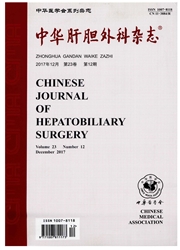

 中文摘要:
中文摘要:
目的 探讨和建立体外扩增胚胎肝干细胞并抑制其分化的培养条件及方法.方法 胶原酶结合机械消化法制备14 d胎龄大鼠胎肝干细胞悬液.将细胞随机分为两组.一组接种至Ⅰ型胶原包被的培养板中,常规贴壁培养.另一组细胞则接种至软琼脂培养基中进行悬浮培养.倒置显微镜下观察两组细胞的生长.培养2周后收集两组细胞,电镜观察两组细胞超微结构的差异,流式细胞仪检测其CD90.1+、CD49F+等干细胞标志物表达特征,碱性磷酸酶染色检测其分化状态的差异.结果 悬浮培养的胎肝干细胞具有高核浆比、胞浆内细胞器不发达等超微结构特征,并高表达CD90.1、CD49F等干细胞标志物,碱性磷酸酶染色阳性;而常规贴壁培养的胎肝干细胞则在培养过程中显示出显著的分化特征.结论 琼脂克隆培养的胎肝干细胞较有血清贴壁培养分化程度低,在琼脂克隆培养条件下能增殖形成具有显著干细胞特征的克隆球.
 英文摘要:
英文摘要:
Objective To develop an ideal cultural method to amplify embryonic hepatic stem cells and inhibit their differentiation in vitro. Methods Suspension of ED 14 Fischer (F) 344 rat em-bryonic hepatic stem cells was prepared by collagenase digestion and mechanical disaggregation. Then cells were divided into two groups randomly. The cells in group 1 were seeded into type I collagen-coated plates by adherent culture while those in group 2 were seeded into soft agar medium by suspen-sion culture. After culture for 2 weeks, the morphology and ultrastructure of cells in both groups were observed and compared by inverted microscope and transmission electron microscope, respectivley.The expression of CD90. 1 and CD49F, the two specific stem cell surface markers, was tested by flow cytometry to manifest the establishment of embryonic hepatic stem cells. Alkaline phosphatase stai-ning was used to detect stem cell differentiation. Result Embryonic hepatic stem cells in group 2 were characterized by higher nucleus-cytoplasm ratio and less cell organelles, higher expression of CD90. 1 and CD49F, and stronger positive reaction for alkaline phosphatase staining compared with those in group 1. Moreover, the cells in group 1 showed significant differentiation features. Conclusion Em-bryonic hepatic stem cells cultured suspendedly in soft agar medium experience less differentiation than those adherently cultured in serum-added culture medium, and can proliferate and form clone ball with a specific stem cell feature.
 同期刊论文项目
同期刊论文项目
 同项目期刊论文
同项目期刊论文
 Replacing Hoechst33342 with rhodamine123 in isolation of cancer stem-like cells from the MHCC97 cell
Replacing Hoechst33342 with rhodamine123 in isolation of cancer stem-like cells from the MHCC97 cell Loss of heterozygosity of the tumor suppressor gene Tg 737 in hepatocellular carcinomas is associate
Loss of heterozygosity of the tumor suppressor gene Tg 737 in hepatocellular carcinomas is associate 期刊信息
期刊信息
